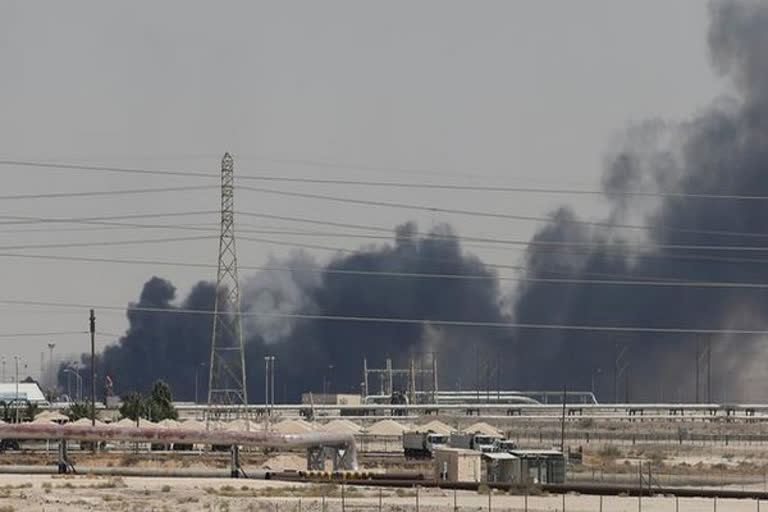Riyadh: Saudi Arabia raced on Sunday to restart operations at oil plants hit by drone attacks which slashed its production by half, as Iran dismissed US claims it was behind the assault.
The Tehran-backed Houthi rebels in neighbouring Yemen, where a Saudi-led coalition is bogged down in a five-year war, have claimed Saturday's strikes on two plants owned by state giant Aramco.
But US Secretary of State Mike Pompeo pointed the finger squarely at Tehran, saying there was no evidence that the "unprecedented attack on the world's energy supply" was launched from Yemen.
"The United States will work with our partners and allies to ensure that energy markets remain well supplied and Iran is held accountable for its aggression," the top US diplomat added.
That drew an angry response from Tehran, where a foreign ministry spokesman said, "Such fruitless and blind accusations and remarks are incomprehensible and meaningless."
The remarks were designed to damage Tehran's reputation and provide a pretext for 'future actions' against the Islamic republic, he added.
Baghdad, caught between its two main sponsors, Tehran and Washington also denied any link to the attacks amid media speculation that the drones were launched from Iraq.
Saudi de facto ruler Crown Prince Mohammed bin Salman, whose nation is pitted against Iran in a decades-old struggle for regional dominance, has said that the kingdom is 'willing and able' to respond to this 'terrorist aggression'.
But a tit-for-tat strike on Iranian oil fields is 'highly unlikely', Middle East expert James Dorsey told AFP.
"The Saudis do not want an open conflict with Iran. The Saudis would like others to fight that war, and the others are reluctant," said Dorsey, from the S Rajaratnam School of International Studies in Singapore.
Instead, the kingdom focused on restoring production at the plants, as the Saudi bourse slumped three per cent as the week's trading began on Sunday morning.
Saturday's explosions set off fires that engulfed the Abqaiq plant, the world's largest oil processing facility, and nearby Khurais, which hosts a massive oil field.
Saudi's energy infrastructure has been hit by the Houthis many times before, but this strike was of a different order, abruptly halting 5.7 million barrels per day (bpd) or about six per cent of the world's oil supply.
"The genie is out of the bottle," said Bill Farren-Price, director of the London-based RS Energy Group.
"It is now clear that Saudi and other Gulf oil facilities are vulnerable to this kind of attack, which means that the geopolitical risk premium for oil needs to rise."
The full extent of the damage was not clear, nor the type of weapons used, and reporters were kept away from the plants amid beefed-up security.
Saudi interior ministry spokesman Mansour al-Turki said that there were no casualties in the attacks.
Aramco has said that it will dip into its reserves to offset the disruption, but the incident could affect investor confidence as its stock market debut looms.
As markets closely watch Saudi's ability to get its industry back on track, Aramco CEO Amin Nasser said on Saturday that 'work is underway' to restore full production.
And newly appointed Energy Minister Prince Abdulaziz bin Salman said that part of the drop would be offset by drawing on vast storage facilities designed to be tapped in times of crisis.
Riyadh, the world's top crude exporter, has built five giant underground storage facilities across the country that can hold tens of millions of barrels of various refined petroleum products.
Following a phone call between US President Donald Trump and Prince Mohammed, the White House condemned the attacks on "infrastructure vital to the global economy".
Tehran and Washington have been at loggerheads since May last year when Trump pulled the US out of a landmark 2015 deal that promised Iran relief from sanctions in return for curbs on its nuclear programme.
Washington's response throws into doubt reported efforts by Trump to arrange a meeting with Iranian President Hassan Rouhani at the upcoming United Nations assembly.
The UN's Yemen envoy Martin Griffiths said that he was 'extremely concerned' over the latest attacks, which also drew swift condemnation from Riyadh's Gulf allies, the UAE, Bahrain, and Kuwait.
Saudi Arabia has spent billions on military hardware but recent events have underscored its infrastructure's vulnerability to attack.
While the kingdom's oil wells, scattered over a vast area, may be tough to hit, its various oil processing facilities are much more exposed.
In recent months, the Houthis have staged repeated cross-border missile and drone attacks targeting Saudi air bases and other facilities in what they say is retaliation for the Riyadh-led bombing campaign on rebel-held areas in Yemen.
Read also: Gold toilet stolen from birthplace of Winston Churchill



